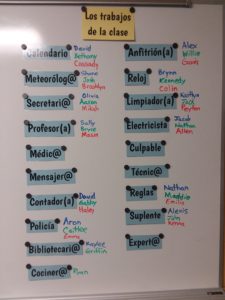 The “October collapse” is upon us. October can be a perfect storm of exhaustion, student apathy, a dearth of daylight, and a general loss of novelty with your classes. I have noticed an increase in social media posts from teachers who are feeling frustrated this time of the year. I know I haven’t been stopping frequently enough to go over my classroom rules. Chances are you and your students are using too much English. Implementing classroom jobs is one way to re-center your classes and concentrate on the norms if things have gone sideways.
The “October collapse” is upon us. October can be a perfect storm of exhaustion, student apathy, a dearth of daylight, and a general loss of novelty with your classes. I have noticed an increase in social media posts from teachers who are feeling frustrated this time of the year. I know I haven’t been stopping frequently enough to go over my classroom rules. Chances are you and your students are using too much English. Implementing classroom jobs is one way to re-center your classes and concentrate on the norms if things have gone sideways.
The beginning of the year or semester is the optimal time to introduce routines that make up the backbone of your class, however the myriad benefits of having kids do these jobs will still accrue to you if you start now. Students are more likely to buy-in to what you’re doing during the honeymoon phase when they still have a mostly positive attitude toward school, get along with everyone, and haven’t fallen behind in other classes. This is especially true for first-year language students, as they have never known anything else.
If someone new to TCI were to ask me about the three most impactful decisions I have made in my teaching, my answer would be:
- Having students keep their phones in a caddy on the wall at all times during class
- Getting rid of my desks
- Assigning classroom jobs
I use classroom jobs because they build community, lower the affective filter, and target high-frequency language. You can use most jobs for any age group and proficiency level as long as you provide the person performing the job with the language that they need to do it confidently. They are also the best way that I’ve found to teach boring subjects such as telling time, the weather, and the calendar.
Ensuring Success with Classroom Jobs
Having a written script that the student can refer to if needed is critical in making your “employees” feel at ease and eager to perform their jobs. This is especially true in the lower levels. Most of your students who have a job that they do on most days won’t need them after their first several weeks in position, but the structures and vocab are there if they need it. I’ve included strips with common phrases and vocabulary that you can cut out and give to your workers.
Anytime I need someone’s services, I ask the student, ¿Me puedes ayudar, por favor? (Can you help me, please?) before soliciting their help because a.) this is one of the most powerful survival phrases for a language learner, and b.) it makes them feel that they are contributing to the class in a valuable way.
Should I Assign Jobs or Let Students Choose?
It depends on the job and how well you know your students. I use a student interest questionnaire on the first day of class to learn more about their capabilities and interests. Thoughtfully assigning jobs or selectively soliciting volunteers makes things runs smoother. The kid who regularly reads for pleasure outside of class will probably do a good job as your librarian. Students who are on the lower end of the proficiency range of your class aren’t the ideal students to serve as the interpreter. Likewise, I’m not going to have the classroom “scapegoat” be a student who has indicated that he or she suffers from extreme anxiety when they’re put on the spot.
Some jobs require a higher degree of proficiency in the target language to perform satisfactorily and provide quality input for the rest of the class. For example, the “substitute” should have a reasonable command over the past tense since this is a core component of the job. Some jobs such as the electrician require minimal speaking and would be ideal for a less proficient student.
Take into consideration the kinesthetic and social needs of your students. A kid who has trouble controlling blurting out may partially satisfy that urge by being the “sound technician”. Someone who enjoys sharing esoteric facts about random topics is the perfect “expert”. The “athletic director” is perfect for the jock who all of a sudden finds himself in a class with none of his teammates and is searching for a way to signal to his classmates what he cares about.
If you have two or more students who want to do the same job, have them audition for it. The rest of the class will love it and you’ll end up with the best person for the job.
Everyone gets a job in my classes. This helps keep everyone invested and listening with the intent to understand because they often don’t know when either I or the class will require their services. My experience is that all students want to do a good job with what they’ve been entrusted with.
When Do Students Get Their Jobs?
I assign some jobs on day one and others as the need arises depending on the level. For example, a Spanish 1 class is going to go awhile without having a librarian because they’re not going to be ready for FVR until later in the semester.
Resist the urge to assign more than a few jobs per day. Your students will get bored and it will feel like a chore for them instead of something fun that the class does together.
Do Students Keep the Same Job All Semester/Year?
That’s up to you. Because every student has a job, nobody is left out. Changing jobs requires a learning curve (some are longer than others). I teach 90-minute blocks over an 18-week semester. My students get very good at their jobs and the attendant phrases. I would say in Spanish 2 on up, the input they are providing to the rest of the class is actually pretty decent and it gets better the longer they hold that job.
How Do I Keep Track of Who Has What Job?

This depends on how much space you have to work with. In any case, I definitely recommend that you write them down somewhere that both you and the class can see them. My average class size is 20 and there is no way that I’ll remember in the moment who has what job even though we only teach 3 classes. I printed out the names of each job in the target language, laminated them, and stuck them on my whiteboard with magnets. I go over and write the person’s name next to the appropriate job card as I’m assigning the job. I use a different color marker for each class. I’m fortunate to have a 16′ whiteboard, so there’s plenty of real estate for my projection area, my “Menu of the Day”, and my classroom jobs roster with space left to spare. Scroll down to the blue “Download” button to get a set of job assignment placards.
Don’t try and do all of the jobs, or even most of them, every day. Your students will get bored and the routines will lose their novelty. Don’t feel like you need to assign a job if it doesn’t fit your school environment or your class’s character. I’ve had classes as small as 12 in the past. In this case, those who wanted to have more than one job could have it.
I tell my students that I am the Director of Human Resources. I reserve the right to “fire” a student who isn’t taking their job seriously or performing it with enthusiasm.
Download the document with the job descriptions or scroll down past the download links to read about each job. Leave a comment and let me know if implementing these jobs has improved your classroom management.

Spanish Classroom Job Reference Sheets
Spanish Classroom Job Assignment Placards
athletic director
The athletic director tells the class what school sports events are coming up and informs them of recent results and standings. This person should be knowledgeable about a wide range of sports and professional athletes so that they can field questions from the teacher and the class.
artist
You’ll use this person a lot if you do One Word Images and class stories. We’ve all had students who love to doodle. Put this person to work for you and help the class at the same time. It helps if this student processes the language quickly so that their drawings don’t prevent them from hearing the language.
caboose
Even though we don’t walk in lines through the hallway in high school, it’s important that certain things happen when we leave the classroom to read outside or go to the computer lab to work on Señor Wooly. I rely on the caboose to make sure everyone has retrieved their phones from the organizer on the wall and hasn’t left anything else behind, the lights are turned off, and there is a message written on the main whiteboard saying where we went in case a student arrives late or someone from the office stops down.
calendar
The calendar tells the day and the date. I prefer to already have this information written on the board and ready to go in the interest of time, but you could have your calendar write it instead. This person is also in charge of keeping track of students’ birthdays. Give them a copy of the school calendar so they can make note of scheduled late arrivals and holidays off for when they report out to the class.
chef
The chef handles anything that has to do with food, whether that be passing out candy prizes or arranging the buffet table for our end-of-semester lunch/farewell party. Sometimes I’ll ask them what is being served in the cafeteria or have them confirm the main ingredients in a dish from the target culture.
This person is my assistant when we cook in class as I model each step before allowing students to try it for themselves.
clock
The teacher asks the clock, “What time is it?” at various times throughout the class and whenever we are talking about when an event starts or ends. If there’s a clock in a Picture Talk or I’m wondering about what time it is in a picture, we rely on this person. Sometimes I’ll ask a random question about what time a certain class period starts or ends, the schedule that runs between our two high schools, or scheduled times for school events like football games and concerts. Going through a modified schedule on the first two-hour delay day of the year provides them with valuable information (especially freshmen) and gives them lots of practice with times.
The key with this job is to naturally work in as many reps of various times as you can. Your students will learn to tell time and understand times when they hear them without explicit instruction sooner than they will using traditional methods because the times will actually have meaning for them and the reps will be spaced out over time, which research shows is essential for long-term acquisition.
conductor of the orchestra
The conductor tells the class to stand up and leads the class in singing “Happy Birthday” and other songs that you may use. The conductor tells the class, “Good job!” and then tells them to sit down when they’re done singing.
counter
The counter handles numbers that come up during whole class reading, PQA, and stories. The counter keeps a stuffed Sesame Street “Count von Count” under their chair. You can buy your very own 14″ Count doll here. When a number comes up that I want them to take note of, the counter says the number in the target language followed by their best impression of the Count’s “Ha ha ha.”
custodian
The custodian verifies that the room is clean before anybody gets up to leave at the end of class. I ask them, “Is there anything on the floor?” or, “Whose insert object is that over there?” For Spanish, this is an ideal way to get reps on important structures like ¿Hay algo…? and ¿De quién es…?.
This person is also in charge of letting me know when we’re running low on tissues, paper towels, and hand sanitizer.
ecologist/conservationist
The ecologist is responsible for ensuring that students are recycling aluminum cans and plastic bottles. Even having a recycling bin literally right next to the trash can, it never fails that some people still throw cans and bottles in the trash. The ecologist will put these where they belong and remind the class about the responsible thing to do. My school also recycles paper, so this person walks around and collects used scrap paper when we’re done with it.
economist
The economist handles all matters involving prices and currency exchange rates. You’ll find yourself using their services often during personalized questions and answers (PQA). The economist can research the names of currency for the target countries and keep a relatively current chart of the values of these currencies relevant to the dollar.
electrician
The electrician turns the lights on and off and also controls any fans, humidifiers, and diffusers. I am a Vornado fan-boy (pun intended and, seriously, I have three of the larger models at home and this whole room air circulator in my classroom).
expert
The expert has the final say when the class can’t agree on a detail for a story or when there is debate over what is true or false. Don’t let people argue with the expert after they have made a ruling.
gardener
You can have a gardener even if you don’t have any live plants in your room. My gardener pretends to “water” my two artificial ficus trees each morning and my kids find it amusing. You could also have them spray your fake plants with a spray bottle. If you do have live plants, your gardener is responsible for watering them, moving them as needed to receive adequate light, and informing you of their general health. Just like the zookeeper is an expert on animals, this person can chime in when there are questions about plants.
historian
I do a “this day in our history” segment every day. You’ll probably figure out who your history buffs are soon enough, or you could show your history/humanities teachers your class rosters and have them tell you. Depending on their knowledge and proficiency level, the historian can provide additional details or confirm dates while we’re discussing what happened on this day in our history. The historian should be comfortable saying these in the target language.
host
The host greets visitors with an appropriate greeting in the target language. I have them say, “Welcome to Spanish ___ class!” and “Have a good day (or weekend)!” when they leave. Make sure you pick someone who will do this with some enthusiasm so that visitors get a good first impression. We practice the host’s lines before they do it for real so that the class can hear how these phrases sound different based on the number and gender of the visitors. Students who arrive late are also greeted the same way.
If an administrator is completing an observation or stopping by to do a walk-through, the host will offer him or her a seat within our class circle (I’m deskless).
interpreter
Sometimes providing a translation in L1 is the quickest way to establish meaning. The interpreter will say or write the word in L1 per your directions. In higher levels (although I encourage circumlocution starting at level one), this person could use circumlocution to try to explain it to the class in the target language.
librarian
I do Free Voluntary Reading (FVR) four days a week at the beginning of class. The librarian tells the class to go get their books at the beginning and to put them away at the end. This person is also in charge of ensuring that the books are facing forward in an orderly manner in our “library”, which is a spinning display rack.
I try to pick one of my stronger readers to be my librarian so that they can also recommend appropriate books to individual students for FVR.
medic
The medic gets bandaids from my first aid kit for students with minor cuts. This person will accompany students who aren’t feeling well to the nurse’s clinic. Since I teach in a STEM school, I choose someone who is in the health science pathway.
messenger
The messenger relays information or notes to and from the office. I pick a stronger speaker to do this job since I have this person report out to the class when they return. This should be someone who you can trust to get from point “A” to point “B” without taking detours to stop and talk with friends.
meteorologist
I ask the meteorologist, “What’s the weather like today?” They can also make forecasts for the weekend and special events like football games and the Homecoming parade.
photographer
The photographer takes whatever pictures I request as well as some of their own. For example, I might ask them to take a picture of the notes on the board from a Special Person Interview and email it to me so I can post it on our learning management system. They can also take fun pictures during Reader’s Theater, running dictations, and other classroom tomfoolery. These pictures can help convey to parents what you do in class on Meet the Teacher/Back to School night.
police officer
The police officer verifies that all cell phones are in the caddy that is hanging on the wall. I’ve been very pleased with the quality, durability, and value of this one that is available from Amazon. This person also tells the class to retrieve their phones at the end of class once the custodian verifies that the room is in satisfactory condition. If you don’t have kids turn in their phones during class (or in addition to this), you could have the police officer be in charge of getting (or attempting to get) the class to quiet down.
I like to pick an assertive, self-confident student for this job. It helps if they naturally command a little more respect than the average student. I usually go with an upperclassman if one is available.
professor
I always write my tentative plan for the day on the whiteboard so that students feel like they’re in the loop. After I check in with the secretary for the attendance, I ask the professor, “What’s the plan of the day?” or, “What are we going to do today?” You can also work on ordinal numbers by asking what we’re doing first, second, third, last, etc.
“What are we going to ___?” is a high-frequency, versatile structure that your students can use in real-world scenarios for making plans for meals, going out with friends, and much more.
psychologist
The psychologist can call for a brain break when they feel the class needs one. Since this person is a student, they will have a better sense of when they need one than you will. They can also lead the brain breaks that they are familiar with.
Sometimes a student will report that they are stressed, frustrated, or generally not doing well when I check in with the class at the beginning. The psychologist could provide some positive affirmations or give advice. For Spanish teachers, this is an ideal way to get reps on Deberías…
secretary
I like to assign this job to a kid who I know needs to move around a lot. The secretary is in charge of handing out copies of readings and other papers, collecting finished assignments, and passing back graded work.
The secretary is also in charge of attendance. Make sure this person has an updated class roster; don’t forget to redact student ID numbers. Most importantly, ensure that the secretary knows who each kid is! This is a natural opportunity to have students properly introduce themselves to one another in the target language and build community from the first day of class.
substitute
I have the substitute ask the secretary, “Who wasn’t here yesterday?” It is the substitute’s responsibility to ensure that anyone who was absent the prior day receives copies of readings and handouts. The substitute collects enough copies of handouts for students who are absent.
This helps (but does not eliminate) students from coming up to me right before class to ask what they missed, or my personal favorite, “I wasn’t here yesterday. Did we do anything?”
I occasionally ask the substitute what we did in class the prior day in order to get reps on the preterit and imperfect first-person plural verb forms. This also helps remind them of the previous day’s topics and conversations.
scapegoat
This one can be a lot of fun, but you need to make sure you pick someone who has a thick skin. The class will blame everything that goes wrong on this person. Everyone turns to this person and says, “Name, it’s all your fault!”
The cafeteria ran out of chicken tenders on Chicken Tender Tuesday? We didn’t get a two-hour delay for fog? The Fortnite server is down? It’s all their fault!
sound board/technician
This one is just a lot of fun if you have “that” student. Pick your most gregarious, attention seeking student to make sound effects at the proper times (it helps to have a cue) during stories, Reader’s Theater, and whole class reading of class novels.
technician
The technician turns my projector on and off and helps me troubleshoot technical problems when they arise. Since I teach in a STEM school, I choose someone who is in the information technology pathway.
zookeeper
The zookeeper is the authority on anything relating to animals. Every class I’ve ever taught has had someone who is an animal lover. I take their suggestions for my “Animal of the Week” and have them confirm details about the animals we are talking about.
If you have a fish aquarium or other classroom pet, the zookeeper is in charge of feeding and taking care of it.
